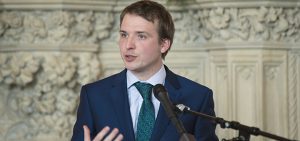
By Sean Ryan - 27 May, 2016

Dr Stephen Bullivant
Almost half the population of England and Wales identifies itself as having no religion according to the findings of a new study.
The report ‘Contemporary Catholicism in England and Wales’ shows that the number having no religion exceeds the number describing themselves as Christian for the first time ever.
In 2014, 48.5% of those surveyed referred to themselves as having no religion, compared to the 25% that fell into the ‘none’ category in the 2011 census.
Those who defined themselves as Christian – Anglicans, Catholics and other denominations – made up 43.8% of the population.
Speaking to the Guardian newspaper, Dr Stephen Bullivant, senior lecturer in theology and ethics at St Mary’s Catholic University in Twickenham and head of the Benedict XVI Centre for Religion and Society, said that there was a “clear sense of the growth of ‘no religion’ as a proportion of the population”.
According to Dr Bullivant, “The main driver is people who were brought up with some religion now saying they have no religion.”
“What we’re seeing is an acceleration in the numbers of people not only not practising their faith on a regular basis, but not even ticking the box. The reason for that is the big question in the sociology of religion,” he said.
Dr Bullivant analysed data collected through British Social Attitudes surveys over three decades, but the report did not look at data from Scotland or Northern Ireland.
However, last month a Scottish Social Attitudes survey found that 52% of the population said they were not religious, compared with 40% in 1999.
In Northern Ireland, which has long been the most religious part of the UK, 7% said in the 2011 census that they belonged to a non-Christian religion or no religion.
London is the most religious area in England and Wales with 60% of the population declaring religious affiliation.
The report shows that non-Christian religions, including Muslims, Hindus and Jews, account for one in five of the capital’s population, far higher than in other areas of England and Wales like the South West, where they represent just one in a hundred.
Meanwhile, Wales, once known as the ‘land of revivals’ owing to the many religious resurgences throughout its history, is the least religious area with a significant majority declaring no religious affiliation (59.3%).
According to Dr Bullivant, “There’s been a great discussion recently as to whether ours is still a ‘Christian country’, and what that actually might mean in concrete terms. This data casts light on the complexity – and indeed variability – of contemporary English and Welsh religiosity.”
He added that the religious make-up of Britain today reflects wider changes in the social profile of the nation: immigration, particularly in the capital, almost certainly plays a large part in this.
“These developments should pose some big questions for religious communities, not least in light of the continuing growth of ‘no religion’ and the fact that none of the Christian churches really seem to be competing effectively.”
According to Dr Bullivant’s report, which was launched at the House of Commons on Tuesday 24 May, the Anglican and Catholic Churches are struggling to retain people brought up as Christians.
The proportion of the population describing themselves as Anglican plunged from 44.5% in 1983 to 19% in 2014. Catholics made up 8.3%, other Christians 15.7% and non-Christian religions 7.7%.